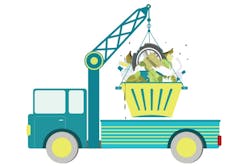Around 80 percent of a car can be recycled, according to a 2016 report in personal finance website The Balance.
In fact, according to the Steel Recycling Institute, automobiles are the most recycled consumer product in the U.S. With so many parts and materials that have the option of being recycled, it only makes sense that collision repair shops would make an effort to recycle anything possible. However, fines issued every year by the Occupational Safety and Health Administration (OSHA) are proof that many collision repairers are not doing so properly.
The environmental impact of recycling is not lost on Kary Kuo, owner of Bumper Globe Collision Centre in Baltimore. Kuo, who took an environmental science course in college that left an impact, says that reversing the negative image that many people have of collision repair shops has always been important to him, and emphasizing recycling is one of the ways that he aims to do that.
"The auto body industry is not known for being environmentally responsible,” Kuo says. “I felt like customers would be more inclined to come to our shop if we displayed this.”
Beyond reversing the stigma, there are rules in place to which shops need to pay attention. Many hazardous materials used in collision shops require the following of rules to properly dispose of them, according to the Environmental Protection Agency (EPA). Shops that are not disposing of materials correctly could face repercussions, such as a fine from OSHA.
Kuo says that when he opened his shop in 2007, he didn’t think most of the surrounding collision repair shops were up to par when it came to environmental practices, allowing him to set his shop apart. Kuo has made recycling a practice in his shop since day one, which he feels has helped appeal to customers and attract more business.
In 2009, the shop was a recipient of a Green Business Award from Baltidome, a green news blog, for its eco-friendly practices, which included a building renovation comprised of 50 percent recycled material. The shop has been written up by local magazines for its eco-friendly efforts and was even contacted by Maryland Public Television for a documentary opportunity.
It is a daily effort to get everyone involved in recycling items in the fast-paced world of collision repair. We make every effort to set time aside to emphasize recycling. By getting everyone on board, it keeps the shop clean and organized and allows everyone to feel good about being environmentally conscious.
In our shop, we recycle papers, metals and plastic. We also recycle solvent and waterborne byproduct and make sure that each is categorized separately. Each bin has a sign that indicates what should be placed inside. We have commercial laundromat plastic bins to handle large volumes of cardboard, metal and plastic. These bins take up a large amount of space, especially for a medium-sized shop like ours with limited parking spaces, so we have to be creative and use the space more efficiently when the time comes for it to be picked up. We do this by keeping up with when the pick ups will happen. We wait until right around the pickup time to haul the bins out to the lot. Everyone knows the schedule for when recycling items will be picked up.
When staff is disposing of solvent and waste, it’s required that they wear National Institute for Occupational Safety and Health (NIOSH) approved filtering respirator masks and protective latex gloves.
We have color-coded recycling bins designated for papers and plastic that are visible around the shop and lobby area. Paper goes in the green bins, metal bottles go in blue and plastic in yellow. We use eye-catching labels above the bins in the lobby to encourage our customers to recycle.
The city picks up recycling items every Friday. We have someone pick up metal and plastic every week. We let him keep all of the money from the metal scraps in exchange for picking up and disposing of the plastic. Safety-Kleen handles the solvent and waterborne waste byproducts.
Sometimes, the cardboard, bags of paper shreds and bottles are not picked up on the scheduled day. We make every effort to find out if these will be picked up or not ahead of time. If not, we return the materials to our controlled environment inside of the shop until the next scheduled pick up. Plastic bumpers pile up quickly, so we try and haul these to the recycling center every other week.
If I notice that something wasn’t recycled or that the staff isn’t keeping up with it, I make a note to discuss it in a meeting and emphasize the importance.
It’s always good to be environmentally responsible. We always get comments from our customers on how unique Bumper Globe is when compared to other stereotypical body shops. Beyond recycling, we’re planning on retrofitting our spray booth with T8 LED lights. The old T8s that have mercury gas in them will need to be properly disposed of at a recycling center.
It takes money to become eco-friendly, but there’s a long-term ROI. For example, using LED light retrofits has cut our utility bill by at least 60 percent. Shop owners need to look at the bigger picture and the benefits of having more efficient equipment. You’ll see a night-and-day difference in your utility bill if you change a few practices.

